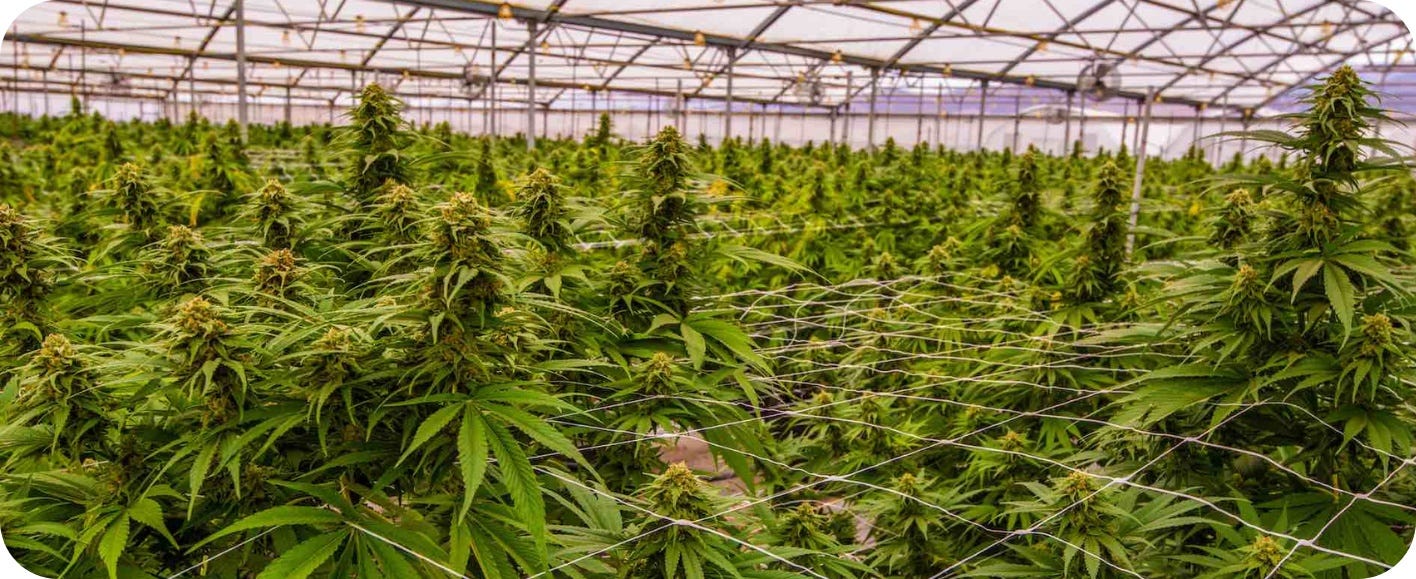The Best Cannabis Business Models
As one Canadian producer closes its production facility, an MSO invests millions to acquire another...
Welcome to Four PM — a newsletter that provides the top cannabis industry news from Canada to California.
Congrats to the province of Ontario which has reached 1,000 cannabis retail stores since legalization on the 17th of October 2018.
In Today’s Issue:
→ The Right Supply Chain. ✅
→ Social Equity In Canada. 👀
→ The Fight Underway In Florida. 👊🏽
Cannabis Business Models
Should cannabis companies partner with producers, or produce the cannabis they need themselves…
Should cannabis brands produce cannabis?
This may sound like a rhetorical question, however, as we examine the business models successful consumer packaged goods companies use — they look very different from many cannabis brands.
Vertical integration…
Many cannabis brands have pursued the path of “vertical integration” where they try and own & operate the entire supply chain.
In Canada this requires producers to cultivate cannabis, to manufacture this cannabis to produce pre-rolls, edibles & beverages, and in many States producers even own their own retail stores.
Now, as the cannabis industry matures we are witnessing the emergence of several successful companies who are unbundling this supply chain.
Cannabis companies can outsource sales, product distribution and certain brands are now opting to outsource the production of cannabis.
Direction one…
California cannabis company Glass House Brands finalized its acquisition of a cannabis facility for $93 million USD this week.
This facility provides Glass House Brands close to 5.5 million square feet of canopy with six greenhouses on a 160-acre agricultural property.
To put this into perspective, that's enough space to fit 144 football pitches.
Direction two…
During the same week, Glass House Brands finalized this acquisition, Canadian producer Tilray is shutting down its “flagship” facility.
This closure marks a sharp shift in the Canadian market as producers begin unwinding their lofty ambitions to produce enough cannabis to supply the entire Canadian market, plus some.
Future Outlook…
Coca-Cola is one of the most successful brands in the world.
Instead of seeking to own the entire supply chain, Coca-Cola outsources the production of the required ingredients for its products.
They oversee the manufacturing of these ingredients and sell the syrup they produce to authorized bottlers.
These partners then add water and carbonation to make the finished Coca-Cola products, while Coke focuses on building a brand which consumers love.
It may be a number of years before cannabis companies can achieve this level of specialization, however, Cookies is already implementing many pages from this playbook today.
Our Take
To predict the future, study the past, and Cookies who are going from success to success in recent years have been at the forefront of implementing a similar business model outside of California.
As opposed to owning the entire supply chain, Cookies provides local cannabis companies its brand and its unique cannabis genetics.
In return, they are successfully scaling their brand in record-breaking time.
Does The Canadian Cannabis Industry Lack Social Equity?
Three years since legalization took effect in Canada, and members of the First Nations groups in Canada want more from the legal cannabis industry…
New York might be making a coordinated effort to prioritize social equity in cannabis, however, it looks like Canada has some catching up to do.
What the numbers say…
The number of cannabis licenses owned by First Nation groups in Canada remains small, however, it’s increasing quickly.
→ Less than 5% of all cannabis license holders in Canada are indigenous-owned or affiliated cannabis businesses.
→ Of the 750 licenses that have been issued, approximately 0.5% are located on one of the 3,000+ reservations in Canada.
→ In August 2020 there were 19 Indigenous cannabis companies, now at 37.
In contrast, 50% of all adult-use cannabis business licenses in New York will be made available to social and economic equity applicants.
What needs to change?
In Canada, first nations groups are meant to have the means to self-govern, however, when it comes to cannabis this is questionable.
“The Cannabis Act as it stands right now is failing, and these stats are indicative of some of the barriers that many First Nations are experiencing” Terry Teegee, chair of the Chief’s Committee on Cannabis for the AFN said.
Currently, first nation groups in Canada have to work within the same regulations as companies such as Canopy Growth or Cronos Group who have raised billions of dollars to finance their operations.
“Here’s an opportunity to reconcile with the Indigenous people now that we have the declaration and the ability to amend the Cannabis Act,” Terry Teegee added.
Our Take
It’s great to see the number of first nations groups in Canada with cannabis licenses doubling.
That said, Canada certainly has room for improvement when it comes to First Nation groups in the region having the autonomy they are asking for.
The Billion Dollar Cannabis Market
The fight to win market share in Florida is picking up steam with more & more competition for Trulieve…
In 2014, Florida legalized medical cannabis.
Despite the fact that the State doesn’t permit cannabis products for adult-use purposes — Florida is the 3rd largest cannabis market in the U.S.
Who’s winning?
Trulieve is the clear winner so far in Florida, controlling about 50% of the entire market today.
Competing in this market requires very deep pockets, with each company having no choice but to vertically integrate its operations from seed to sale.
Despite these costs, new market entrants are slashing prices in the hopes they can take customers away from Trulieve.
“There’s a race to the bottom from a pricing standpoint as these companies try to get consumers in the store,” says Brady Cobb.
The big fish…
Several successful cannabis companies have recently entered Florida.
California-based Cookies is one such company aiming to win market share in the State home to some 21.5 million people.
Cookies is currently building a chain of retail stores in the region in addition to a 400,000-square-foot indoor cultivation facility.
This marks the very first time Cookies has pursued “vertical integration” outside of California.
Looking at the competition, Cookies CEO Berner said “The current operators out there haven't been doing the best job offering quality flower”
Next on the list is Planet13 who’s cannabis superstore in Las Vegas accounts for 10% of all cannabis sales in Nevada.
To compete in Florida, Planet 13 spent some $55 million USD to acquire the required license alone.
In February 2021, Ayr Wellness closed its deal to buy Liberty Health Sciences’ operations in Florida in an all-stock deal valued at $400+ million USD.
Last, but certainly not least is Curaleaf who expanded into Florida in 2018 and has since opened 33 retail locations in the state, servicing some 400,00 registered medical cannabis patients.
Tough competition…
Trulieve’s roster of competition might be increasing, however, the company has retained close to 50% market share courtesy of having 92 retail locations.
Of the 2.31 million ounces of cannabis sold in Florida since the beginning of this year, Trulieve has sold more than 2.7x more cannabis than its two largest competitors combined.
→ Parallel sold 194,469 ounces.
→ Curaleaf sold 255,719 ounces.
→ Trulieve sold 1.15 million ounces.
Our Take
With over 130 million tourists coming to Florida in 2019, I suspect this market is poised for substantial growth when adult-use sales are permitted.
Winning market share might be expensive right now, however, perhaps these companies see their medical operations providing an off-ramp to the adult-use market when sales are permitted.
For more like this, subscribe to Four PM today to receive the next edition:
If you gained value from this edition of Four PM, share it with your favorite cannabis professionals. 🌎










